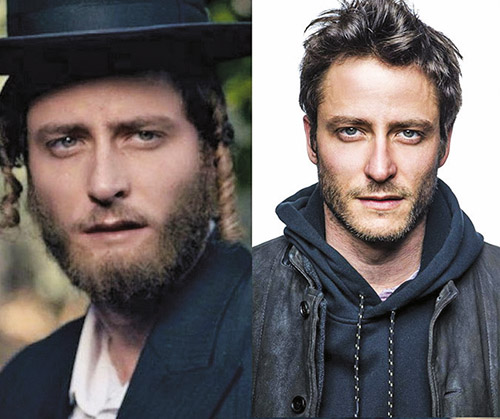
Science’s loss is ‘Shtisel’s’ Gain—And Michael Aloni’s immersion in Geula.
It’s no secret to audiences that Michael Aloni is handsome, gifted, multitalented—and thoroughly blessed. Aloni knows this as well, but he’s neither vain, nor arrogant, nor self-aggrandizing. He’s just matter-of-fact about his accomplishments.
That was abundantly clear at the recent “Let’s Talk Shtisel” virtual event, the Jewish National Fund-USA’s largest, most-anticipated national Women for Israel event of the year. Aloni was interviewed by Danna Stern, managing director of Israel’s yes Studios (producer-distributor of “Shtisel,” “Fauda” and other hit television series) credited by The Hollywood Reporter with “turning Israel into a global television powerhouse.”
Aloni, who plays Akiva Shtisel, the perennially conflicted artist who is central to the global megahit “Shtisel,” has also starred in “When Heroes Fly” and recently in “The Beauty Queen of Jerusalem.” During his conversation with Stern, he seemed quite unlike his angst-filled “ultra-Orthodox” (read: haredi), on-screen alter ego, but of course, that’s attributable to great acting.
Aloni—confident, soft-spoken and forthcoming about his multiple ventures on the screen, stage and printed page—cited two other striking achievements. One was how the “Shtisel” production team, including Aloni, was able to pull off a remarkably successful Season 3 during the global pandemic, in summer’s heat, when fake beards came unglued. Aloni’s second, and eerier, accomplishment was his prediction of the pandemic in his novel, “Love in the Time of Flu,” published four years ago. Perhaps his powerful “hook” might not seem on par with the claim that Al Gore invented the internet (LOL), but it was certainly compelling.
Aloni’s career path was relatively unusual in the arts and entertainment world, because he had no aspiration to be a “creative,” and no direct family connections to pave the way for him. As a self-described “extreme nerd” in high school, he leaned towards physics because he wanted to change the world. Then, like many Israelis, post-military service, he wanted to forget everything that happened before, buy a cheap ticket to India (or wherever), and just get away from it all.
Aloni worked odd jobs to save for this “escape.” While handing out flyers in a mall, a casting agent spotted him and invited him to audition for what became the longest-running Israeli children’s TV show. The lead paid off. Although Aloni maintains he never aspired to this career, it happened. “The profession sort of chose me,” he said.
Almost every opportunity in life, including celebrity status, has its tradeoffs, and this was Aloni’s: He lost his anonymity. Sure, people recognized him on the street, but the extent to which it escalated got a bit scary. He was chased by teen girls and “I got panicked … like paranoid all of a sudden,” he said.
The upside of his newfound fame was that he could now choose roles and reject any he disliked. This serendipitous thrust into the limelight made him fall in love with the actor’s craft, and for three years he immersed himself in one of the top conservatory courses in Israel, fully recognizing that acting takes over your life 12 hours per day. This immersion paved the way for “Shtisel”—and his preparation for Akiva’s character.
Aloni was friends with Dikla Barkai, the show’s producer. When she showed him the script, he thought it was the most beautiful one he had ever read. He wondered, though, how it would be possible to sell a show without physical contact, let alone intimacy. Nevertheless, infatuated with the story, he told her, “Let’s make a show that no one will watch.” And so Akiva and “Shtisel” (released at the same time as “When Heroes Fly”) were born. Paradoxically, the show no one would watch became the show that nearly everybody, including diverse Israelis, would watch.
Although Aloni was a familiar face to secular audiences in Israel from past shows, he was unknown in the haredi world when “Shtisel” was first released. The crew shot scenes in Mea Shearim using cameras hidden in vehicles—film crews can’t work openly there—so people couldn’t necessarily distinguish reality from what was being filmed in the streets. For example, Aloni, playing Akiva, hung posters to give away a heater, and some random person approached him about it. That incident was incorporated into the episode. Everyday people sometimes became part of the scenes.
In Season 1, Aloni could be “anonymous,” but by Season 2, residents would call, “Kive, Kive, kumah haer!” To these people Aloni was Akiva, and he was offered multiple shidduchim.
Anonymity was impossible, as everyone has cell phones. People downloaded the episodes even before they aired. The show was also integrated into the culture, and Aloni described how at weddings, they would play themes from “Shtisel” and dress up like members of the family. Overall, the show has created a bridge between secular and religious Israelis, and beyond that, it resonates among Jews and non-Jews worldwide.
Aloni never conceived that the audience for “Shtisel” would rival that of action-packed “When Heroes Fly”; yet his packed Instagram account reflects global interest. He’s been stopped by non-Jews in far-flung places such as Brazil. He’s been messaged from Hong Kong.
What is at the heart of “Shtisel” that makes it so endearing across the globe? It’s not about a show about haredim, rather, it’s the story of a dysfunctional family and characters who are flawed in their own way. Aloni asserts that “… regardless of religion, everyone has dreams,” and sees themselves in “Shtisel.”
“It’s a series about human beings and not about ‘them and us.’ And that is what makes everyone watch.”
Rachel Kovacs is an adjunct associate professor of communication at CUNY, a PR professional, theater reviewer for offoffonline.com, and a Judaics teacher. She can be reached at [email protected].













